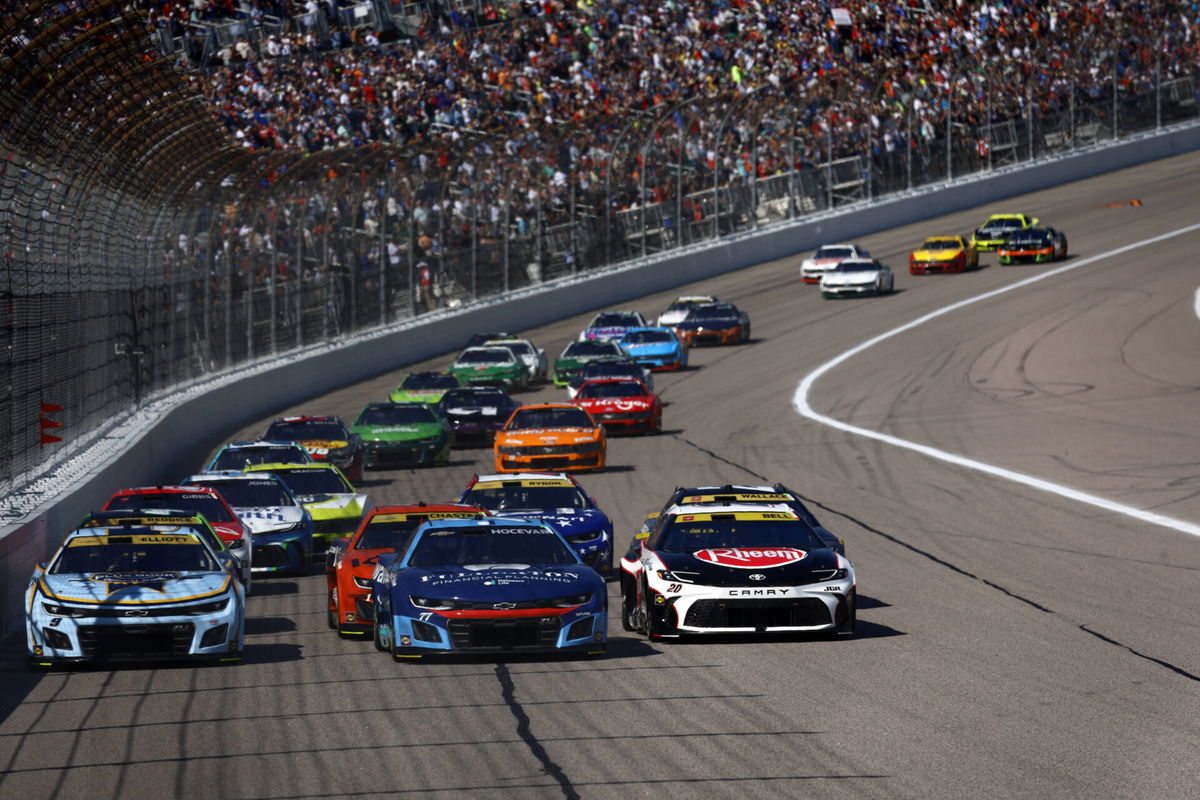
Imago
September 28, 2025, Kansas City, Ks, USA: CARSON HOCEVAR 77 of Portage, MI battles for position for the Hollywood Casino 400 Presented by ESPN BET in Kansas City, KS. Kansas City USA – ZUMAa161 20250928_aaa_a161_006 Copyright: xWalterxG.xArcexSr.x

Imago
September 28, 2025, Kansas City, Ks, USA: CARSON HOCEVAR 77 of Portage, MI battles for position for the Hollywood Casino 400 Presented by ESPN BET in Kansas City, KS. Kansas City USA – ZUMAa161 20250928_aaa_a161_006 Copyright: xWalterxG.xArcexSr.x

Imago
September 28, 2025, Kansas City, Ks, USA: CARSON HOCEVAR 77 of Portage, MI battles for position for the Hollywood Casino 400 Presented by ESPN BET in Kansas City, KS. Kansas City USA – ZUMAa161 20250928_aaa_a161_006 Copyright: xWalterxG.xArcexSr.x

Imago
September 28, 2025, Kansas City, Ks, USA: CARSON HOCEVAR 77 of Portage, MI battles for position for the Hollywood Casino 400 Presented by ESPN BET in Kansas City, KS. Kansas City USA – ZUMAa161 20250928_aaa_a161_006 Copyright: xWalterxG.xArcexSr.x
Remember when the 2012 Cup Series champion hopped onto the podcast with Corey LaJoie? Brad Keselowski said that NASCAR is planning to up the horsepower for 2026. He also criticised the fear of the current Next-Gen car, saying that it has changed him “in some ways for worse as a driver.” And then came the comparison to “an old pickup truck.” Hopefully, now, with the NASCAR president stepping in, all drivers and fans who have been against the 670 hp can all let out a collective sigh.
Watch What’s Trending Now!
In what can best be defined as a bombshell for 2026, competition officials confirmed Wednesday that Cup Series cars will roar at 750 hp at road courses and ovals under 1.5 miles. The news broke on this week’s Dale Jr. Download when NASCAR president Steve O’Donnell revealed the long-anticipated boost, bumping power from the current 670 baseline used across the top division.
However, change doesn’t come cheaply or easily. O’Donnell explained the balancing act NASCAR faces: “Why not 800? Why not 1,000? So if you look at where we are today, where we can go without completely changing over the industry… If you went beyond 750, we looked at almost $40-50 million cost to the industry. So, if you look at our job is, yeah, you want to make a call right away. But you have to think about the out years.”
While acknowledging the increase in speed, O’Donnell pressed on a bigger issue. Pushing beyond 750 hp isn’t off the table because of the tapered space, but the real problem lies in the NASCAR engine use rules. This requires each engine to last for at least two races. Once horsepower climbs higher, the extra stress on internal components starts to threaten durability. In other words, more power means parts wear out faster, and replacing or rebuilding engines more often would drive costs through the roof.
On DaleJr’s podcast, O’Donnell said going to more than 750hp would be a significant cost. It isn’t that the tapered spacer is issue; it’s with engine-use rules of pretty much at least two races per engine, that durability of the parts/pieces comes into question with more hp. https://t.co/5FvTGWAbSh
— Bob Pockrass (@bobpockrass) October 8, 2025
But the change is altogether slight, about a 12% increase in horsepower. The move comes after months of growing pressure from all corners. Drivers are craving more throttle response, teams want better race balance, and fans simply want the old-school punch back in the Next Gen era.
Moreover, Brad Keselowski, who started the rumor about the increased horsepower, can finally kick his feet up with a smile. Speaking on the Stacking Pennies podcast a few weeks ago, he said, “I am definitely Team Horsepower.” And now everyone on team horsepower can let out a deep sigh.
Manufacturers such as Dodge, Chevrolet, Ford, and Toyota have already given the thumbs up to the bump, though they are also exploring potential new engine designs that could shape NASCAR’s next power era.
To back it up, a Goodyear tire test is set for early December at North Wilkesboro, where data will guide tire development for the 2026 season. And yes, the new 750 hp setup will include Nashville Superspeedway’s 1.33-mile concrete oval. Moreover, with changes being made to the playoff systems as well, NASCAR has really been looking out for its fans, and NASCAR insiders have taken notice of it.
However, beyond the horsepower bump, NASCAR’s Steve O’Donnell had plenty more to tease, from potential tweaks to the championship format to reopening the Cup garage for fresh waves of innovation.
NASCAR president admits to hating the winner-take-all final amid playoff and horsepower changes
When it comes to the playoff system, O’Donnell was firm but measured, saying that fans shouldn’t expect any sweeping announcements until the 2025 season wraps up. O’Donnell said, “We got rules in place for this year. What I don’t want to do is take away from whoever wins the championship this year. Those were the rules. Everybody knew them. Let’s go race, and whoever wins that championship, I’m going to stand behind that driver and team and say that’s our champion.”
He stopped short of revealing exactly what changes are on the table, but one thing is clear—NASCAR seems ready to move beyond the fun race, winner takes all. O’Donnell even mentions that he’s been having some eye-opening talks with at least one driver about how the format could evolve.
He added, “So what gets me to think about it is Christopher Bell. The guy who will come in and have a conversation with me behind closed doors doesn’t go out and tweet about everything and say, ‘Hey, here’s what I think. Here’s what.’ He just gives me an honest opinion, which I agree with, of, ‘Hey, man, if I roll off 10 wins in a year, and I go to one race and couple other guys get into me or whatever, I’m not the champion.’ Four years in a row, that happens. I don’t want the next Christopher Bell, who is ten years old right now, thinking about NASCAR, wanting to go to NASCAR, wanting to be a champion, and say, ‘Huh, this is a little bit more of a chance on a one race, right?'”
As the discussion unfolded, O’Donnell admitted he had grown wary of how the playoff date seemed to hijack every race weekend. Too often, great storylines like Harrison Burton’s emotional win after losing his ride get buried under endless chatter about playoff math. Even Shane van Gisbergen’s remarkable run of road and street course victories couldn’t escape the noise, with talk shifting to whether he truly belonged in the postseason mix.
However, one thing is definitely certain: NASCAR has been keeping tabs on all the issues raised by teams and fans. Better late than never, and NASCAR is on its way to redemption.



